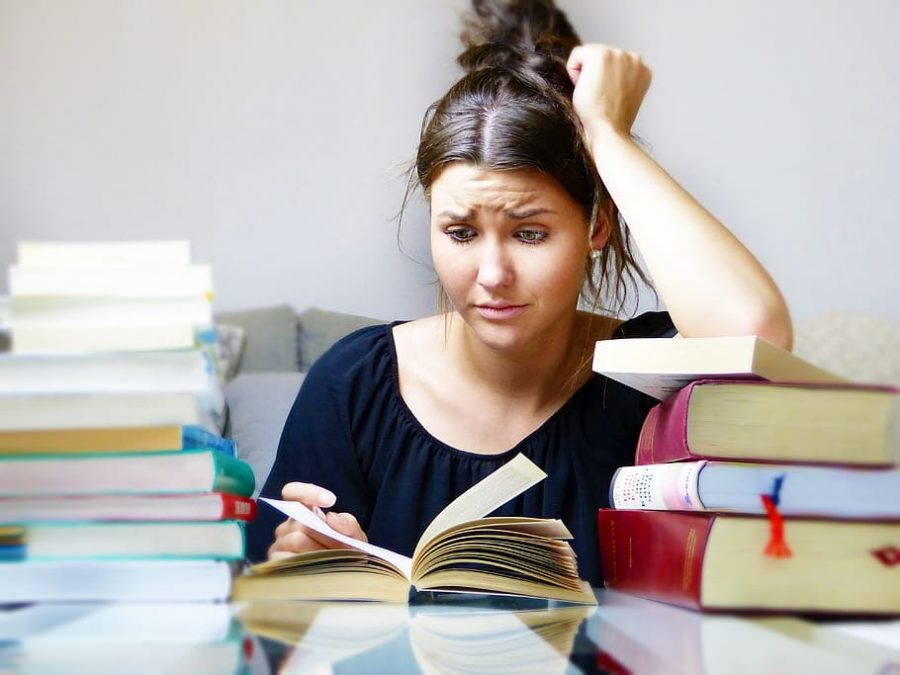Dealing with burnout, the countdown to finals begins
November 20, 2021
Although it feels like just yesterday I was writing my first editorial, this marks our 7th issue of the Crier and the end of the last full week of classes of the semester. I didn’t realize this was coming until Father Francis announced the news at Mass on Sunday the 14th. Father Mathias promptly laughed when he saw the shock pass over my face, proceeding to say to the congregation that he thought we may need a defibrillator to revive some students.
One of the reasons I think I was so surprised to see just how far along in the semester we are is because it has felt like this semester has been all gas, no breaks. It seems like being tired, stressed, and overwhelmed is becoming a personality trait for many students.
While burnout can look different for each person, I have found the general idea is feeling overwhelmed to the point where it negatively affects students’ work, motivation, and mental health. This has become an increasingly important issue as the campus has experienced various illnesses being spread, as we go from wearing masks 24/7 to interacting somewhat normally as a vaccinated community. I know that I’m not the only student on campus who has pushed through an illness out of fear of falling behind and ended up getting worse because of it. I can only speak from my own experience that I feel like I pushed myself to the breaking point with schoolwork and extracurriculars, while also trying to balance mental health and friendships, and it took my body shutting down for me to actually pause.
The World Health Organization defines burnout as “a syndrome conceptualized as resulting from chronic workplace stress that has not been successfully managed” and is characterized by “feelings of energy depletion or exhaustion; increased mental distance from one’s job, or feelings of negativism or cynicism related to one’s job; and reduced professional efficacy.” On their website the WHO says that burnout refers specifically to occupational contexts and “should not be applied to describe experiences in other areas of life.” In addition to outside jobs or clinicals, I would argue that being a student is a full time job. Whether you want to call it burnout or not, I believe that I speak for many when I say we are going through it.
The 2020 Stress in America survey by the American Psychological Association explored the impacts of the Coronavirus pandemic on stress levels nationwide. 87% of Gen Z adults (born in 1997 or later) that attend college reported education as a significant source of stress.
Additionally, 67% say the coronavirus pandemic makes planning for their future feel impossible. All students have felt the effects of the pandemic on their education in one way or another. For underclassmen it could have been stress over entering a new environment during times of uncertainty. For upperclassmen, fear over post-grad plans as the nation continues to struggle with pandemic problems. The moral of the story is that we’re all feeling the effects of a fast-paced college environment with COVID an added layer of stress for some students, and many are facing negative consequences for their mental and/or physical health.
I’ve already written about the importance of mental health in college and my wish that the school would provide us with mental health days to help avoid burnout. I won’t go through the whole thing again, but I would like to address the fact that we do not get Veteran’s day or Labor day off. Many other schools accommodate the holidays into their academic calendar, including the University of New Hampshire and nearby Southern New Hampshire University. One or two days off may not seem to do much, but ask almost any college student and I’d be willing to bet that even one class being cancelled provides a wave of relief and excitement for a temporary break.
I don’t think that these two days off alone would eliminate college student burnout, sometimes it’s inevitable due to demands and challenges of being a college student. Still, those two days possibly combined with a few mental health days sprinkled throughout the semester could give students a chance to breathe. Whether they decide to spend their days catching up on work, relaxing, or catching up with friends, it gives them an opportunity to press pause.
For now, all students can do is their best to get through the remainder of the semester. I could go through various ways students can prepare for finals or practice self care. However, for now I just encourage students to enjoy the gifts of Thanksgiving break. We all need it.



